 A sharply divided U.S. Supreme Court handed down two 5-4 decisions today, both of which can be seen as positive, if narrow, decisions favoring equal rights.
A sharply divided U.S. Supreme Court handed down two 5-4 decisions today, both of which can be seen as positive, if narrow, decisions favoring equal rights.
One SCOTUS decision had the effect of reinstating a 2010 U.S. District Court ruling that California's Proposition 8, banning marriage equality in the state, was unconstitutional. The other decision established that the federal Defense of Marriage Act (DOMA) unconstitutionally violated the constitutional rights of same-sex couples who have been married in a state which recognizes the right of same-sex couples to marry.
However, by ruling in Hollingsworth v. Perry [PDF] (hereinafter the "Prop 8 case") that the proponents of Prop 8 --- a voter approved ballot initiative --- lacked standing to appeal U.S. District Judge Vaughn Walker's 136-page decision in Perry v. Schwarzenegger and by limiting its decision in United States v. Windsor [PDF] (the "DOMA case") to the constitutional rights of same-sex couples who have been married in a state which recognizes the right of same sex-couples, the court left open to future adjudication of two vitally important questions:
- Do same-sex couples have a constitutional right to marry in states which have not formally recognized the right to do so?
- Must states, which do not permit same-sex couples to marry, recognize the marital rights of those same-sex couples who have chosen to marry in other states where it is permitted?
Those questions remain, even as today's Supreme Court decisions provide an important pair of victories that move the United States two steps closer to the day when sexual preference will no longer be seen as a measure of an individual's or a couple's character...
Narrow Rulings
The only issue decided by the Prop 8 case entailed whether the Court had the jurisdiction to reach the merits of the case. Specifically, Article III of the U.S. Constitution limits the Court's jurisdiction to "Cases" or "Controversies." To meet that requirement, a litigant filing an appeal must demonstrate that they have legal standing to take part in the case. Legal standing is a concept that requires a showing that the appealing party seeks a remedy for a personal or tangible harm.
A generalized grievance has never been considered a sufficient harm to satisfy the Article III standing requirement. Once Judge Walker issued his decision, declaring Prop 8 to be unconstitutional, blocking state officials from enforcing the ban on same-sex marriage, the State of California was the only party which had standing to appeal the decision. But none of the CA officials named in the Prop 8 case, specifically the Governor and the Attorney General, sought to appeal the decision. They were, apparently, just fine with the ban on marriage equality being lifted by the District Court.
In the Prop 8 majority opinion today, written by Chief Justice John Roberts and joined by Justices Scalia, Ginsburg, Breyer and Kagan, the Court ruled that while the CA Supreme Court had the right to determine whether the proponents of a ballot initiative have standing to defend that initiative in state courts, the question of standing in federal court courts entails a question of federal law. Once approved by the voters, Prop 8 became a "duly enacted constitutional amendment or statute," and the Prop 8 proponents, the private individuals or groups responsible for placing it onto the ballot, became no more than "concerned bystanders" who lacked a "personal stake" in the determination as to whether it should be upheld or enjoined.
The Court distinguished such proponents from state legislators who might place an initiative on the ballot through the legislative process, because those legislators would have standing while they were acting in their official capacity. However, the Court found here that the proponents of Prop 8, in this case, lacked such an "official capacity."
In his dissent, Justice Anthony Kennedy countered that the proponents of Prop 8 did have standing because the CA Supreme Court had determined, at the request of the U.S. 9th Circuit Court of Appeal, that they had a right to represent the state to defend the constitutionality of the ballot initiative when state officials refused to do so. He argued that the Court had shown disrespect towards a state's decision as to who was entitled to represent it in such challenges, adding that "the Court's opinion today means that a single district court can make a decision with far-reaching effects that cannot be reviewed."
That aspect of Kennedy's dissent is an overstatement. Although the impact of the Court's Prop 8 ruling was to reinstate Judge Walker's conclusion that Prop 8's ban on same-sex marriage violated the due process and equal protection rights of same sex couples in California to marry, it in no way prevents a U.S. District Court judge in another state, say Texas, from ruling that a ban on same-sex marriage by the Lone Star state is constitutional.
So, to be clear, today's ruling in the Prop 8 case was not a ruling on the merits of the actual case --- a critical fact that perhaps explains why Justice Sonia Sotomayor joined with Justices Kennedy, Thomas and Alito in dissenting on the Prop 8 case ruling. Indeed, oral arguments in the Prop 8 case produced this colloquy between Sotomayor and Perry's legal counsel, former U.S. Solicitor General Ted Olson.
MR. OLSON: Yes, the Ninth Circuit did that. You can decide the standing case that limits it to the decision of the district court here...
The DOMA case brought a very different alignment of the Court. There, Justice Kennedy wrote the majority opinion, serving in his more usual role these days, as the "swing vote" between the Court's conservative and liberal wings. Kennedy was joined by Justices Ginsberg, Breyer, Sotomayor and Kagan.
In the DOMA case, there was a question about standing as well. In this case, the Executive Branch decided not to defend the federal Defense of Marriage Act, after it was found to be unconstitutional by a lower court. Instead, the U.S. was essentially represented before the Supreme Court by the so-called Bipartisal Legal Advisory Group (BLAG), a group assembled and paid to defend DOMA by the U.S. House Republicans. Justice Scalia essentially accused the majority of judicial activism, claiming that it was "eager --- hungry --- to tell its view of the legal question at the heart of the case." Justice Alito, though he disagreed with the majority on the merits, agreed that the BLAG had standing, reiterating that he thought the petitioners in the Prop 8 case had standing as well.
After it turned to the merits, the DOMA case majority produced a narrowly tailored decision that was grounded upon principles of federalism
"States," Justice Kennedy observed in his majority opinion, "have 'virtually exclusive primacy...in the regulation of domestic relations.'"
"DOMA rejects the long-established precept that the incidents, benefits, and obligations of marriage are uniform for all married couples within each State, though they may vary, subject to constitutional guarantees, from one State to the next," he wrote for the majority.
While offering up that DOMA "operates to deprive same-sex couples of the benefits and responsibilities that come with the federal recognition of their marriages," Justice Kennedy took care to limit the scope of the Court's DOMA decision:
In other words, federal benefits --- hundreds of them --- which otherwise apply to married couples, must also apply to same-sex couples who are duly married in a state which allows for marriage equality. It was another victory, for equality, if another narrow one.
But then perhaps not that narrow. With California now being added, marital equality (the right of same-sex couples to marry) is now the law in 13 states and the District of Columbia. That means that a full one-third of the nation's population now live in jurisdictions where same-sex couples can marry.
Unresolved questions
By avoiding a substantive ruling in the Prop 8 case and by limiting its ruling in the DOMA case to the rights of same-sex couples in states which already recognize marriage equality, the Court left open to future adjudication whether or not same-sex couples have a constitutional right to marry in every state and the still unresolved question of whether states which do not permit same-sex marriage within their own boundaries must extend recognition to same-sex couples who marry in other states pursuant to the Full Faith and Credit Clause of the U.S. Constitution.


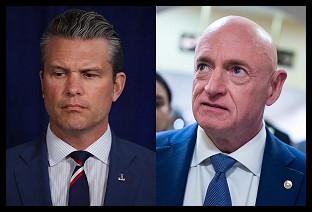 Court Blocks Hegseth Censure of Sen. Mark Kelly
Court Blocks Hegseth Censure of Sen. Mark Kelly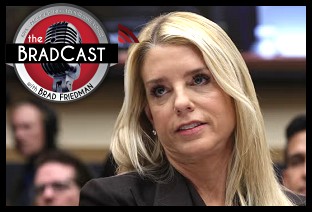 Harpy Tantrums, Legal Losses, Election Fails, Retreating ICE and Other Hopeful Signs: 'BradCast' 2/12/26
Harpy Tantrums, Legal Losses, Election Fails, Retreating ICE and Other Hopeful Signs: 'BradCast' 2/12/26 'Green News Report' 2/12/26
'Green News Report' 2/12/26
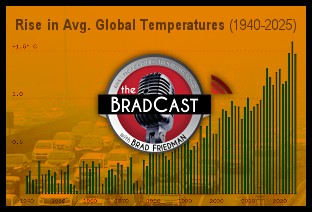 'Let Kids with Asthma Suffer': Trump to Reverse EPA's Landmark 'Endangerment Finding': 'BradCast' 2/11/26
'Let Kids with Asthma Suffer': Trump to Reverse EPA's Landmark 'Endangerment Finding': 'BradCast' 2/11/26 Trump's Presidency Now About Little More Than Racism, Corruption, Culture War Nonsense: 'BradCast' 2/10/26
Trump's Presidency Now About Little More Than Racism, Corruption, Culture War Nonsense: 'BradCast' 2/10/26 'Green News Report' 2/10/26
'Green News Report' 2/10/26 About Trump's FBI Raid of the Fulton County, GA Elections Warehouse: 'BradCast' 2/9/26
About Trump's FBI Raid of the Fulton County, GA Elections Warehouse: 'BradCast' 2/9/26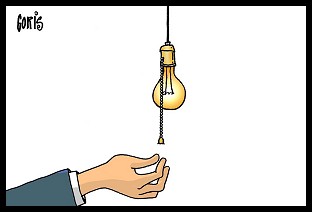 Sunday 'Dead in Darkness' Toons
Sunday 'Dead in Darkness' Toons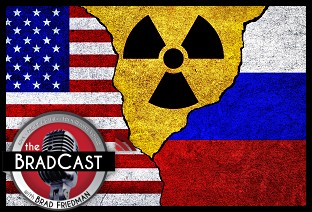 'New START' Treaty Allowed to End Amid New World Disorder: 'BradCast' 2/5/26
'New START' Treaty Allowed to End Amid New World Disorder: 'BradCast' 2/5/26 'Green News Report' 2/5/26
'Green News Report' 2/5/26 Trump Turns 'War on Terror' Tools Against Domestic Political Foes: 'BradCast' 2/4/26
Trump Turns 'War on Terror' Tools Against Domestic Political Foes: 'BradCast' 2/4/26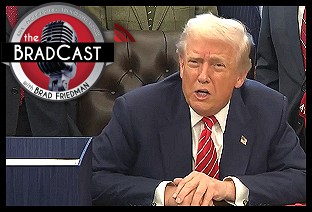 Losing Legally and Politically, Trump Threatens to 'Nationalize' Elections: 'BradCast' 2/3/26
Losing Legally and Politically, Trump Threatens to 'Nationalize' Elections: 'BradCast' 2/3/26 'Green News Report' 2/3/26
'Green News Report' 2/3/26 Bad and Good Bunnies, and an Electoral Shock in Deep 'Red' TX: 'BradCast' 2/2/26
Bad and Good Bunnies, and an Electoral Shock in Deep 'Red' TX: 'BradCast' 2/2/26 Sunday 'Mirror, Mirror' Toons
Sunday 'Mirror, Mirror' Toons 'Green News Report' 1/29/26
'Green News Report' 1/29/26 It's About Elections and the Windmills of His Mind: 'BradCast' 1/29/26
It's About Elections and the Windmills of His Mind: 'BradCast' 1/29/26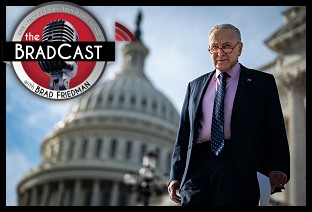 Govt Shutdown Over ICE Funding Near Certain This Weekend: 'BradCast' 1/28/26
Govt Shutdown Over ICE Funding Near Certain This Weekend: 'BradCast' 1/28/26 Trump Blinks, Bovino Out, MN Op Falters, Persists as Midterms Loom: 'BradCast' 1/27
Trump Blinks, Bovino Out, MN Op Falters, Persists as Midterms Loom: 'BradCast' 1/27 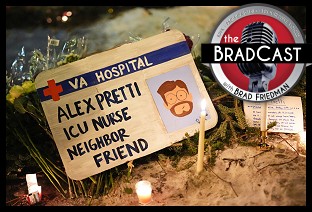 The ICE Murder of ICU Nurse Alex Pretti and the Heroes of Mpls: 'BradCast' 1/26/26
The ICE Murder of ICU Nurse Alex Pretti and the Heroes of Mpls: 'BradCast' 1/26/26  The BRAD BLOG: 22 Years and Still Counting
The BRAD BLOG: 22 Years and Still Counting Mr. Smith Testifies (Publicly) in Washington: 'BradCast' 1/22/26
Mr. Smith Testifies (Publicly) in Washington: 'BradCast' 1/22/26 World Turning Against Self-Destructing U.S. Under Trump: 'BradCast' 1/21/26
World Turning Against Self-Destructing U.S. Under Trump: 'BradCast' 1/21/26 Trump Waste, Fraud, Abuse on Voting, at DOJ, by DOGE: 'BradCast' 1/20/26
Trump Waste, Fraud, Abuse on Voting, at DOJ, by DOGE: 'BradCast' 1/20/26
 VA GOP VOTER REG FRAUDSTER OFF HOOK
VA GOP VOTER REG FRAUDSTER OFF HOOK Criminal GOP Voter Registration Fraud Probe Expanding in VA
Criminal GOP Voter Registration Fraud Probe Expanding in VA DOJ PROBE SOUGHT AFTER VA ARREST
DOJ PROBE SOUGHT AFTER VA ARREST Arrest in VA: GOP Voter Reg Scandal Widens
Arrest in VA: GOP Voter Reg Scandal Widens ALL TOGETHER: ROVE, SPROUL, KOCHS, RNC
ALL TOGETHER: ROVE, SPROUL, KOCHS, RNC LATimes: RNC's 'Fired' Sproul Working for Repubs in 'as Many as 30 States'
LATimes: RNC's 'Fired' Sproul Working for Repubs in 'as Many as 30 States' 'Fired' Sproul Group 'Cloned', Still Working for Republicans in At Least 10 States
'Fired' Sproul Group 'Cloned', Still Working for Republicans in At Least 10 States FINALLY: FOX ON GOP REG FRAUD SCANDAL
FINALLY: FOX ON GOP REG FRAUD SCANDAL COLORADO FOLLOWS FLORIDA WITH GOP CRIMINAL INVESTIGATION
COLORADO FOLLOWS FLORIDA WITH GOP CRIMINAL INVESTIGATION CRIMINAL PROBE LAUNCHED INTO GOP VOTER REGISTRATION FRAUD SCANDAL IN FL
CRIMINAL PROBE LAUNCHED INTO GOP VOTER REGISTRATION FRAUD SCANDAL IN FL Brad Breaks PA Photo ID & GOP Registration Fraud Scandal News on Hartmann TV
Brad Breaks PA Photo ID & GOP Registration Fraud Scandal News on Hartmann TV  CAUGHT ON TAPE: COORDINATED NATIONWIDE GOP VOTER REG SCAM
CAUGHT ON TAPE: COORDINATED NATIONWIDE GOP VOTER REG SCAM CRIMINAL ELECTION FRAUD COMPLAINT FILED AGAINST GOP 'FRAUD' FIRM
CRIMINAL ELECTION FRAUD COMPLAINT FILED AGAINST GOP 'FRAUD' FIRM RICK SCOTT GETS ROLLED IN GOP REGISTRATION FRAUD SCANDAL
RICK SCOTT GETS ROLLED IN GOP REGISTRATION FRAUD SCANDAL VIDEO: Brad Breaks GOP Reg Fraud Scandal on Hartmann TV
VIDEO: Brad Breaks GOP Reg Fraud Scandal on Hartmann TV RNC FIRES NATIONAL VOTER REGISTRATION FIRM FOR FRAUD
RNC FIRES NATIONAL VOTER REGISTRATION FIRM FOR FRAUD EXCLUSIVE: Intvw w/ FL Official Who First Discovered GOP Reg Fraud
EXCLUSIVE: Intvw w/ FL Official Who First Discovered GOP Reg Fraud GOP REGISTRATION FRAUD FOUND IN FL
GOP REGISTRATION FRAUD FOUND IN FL

































